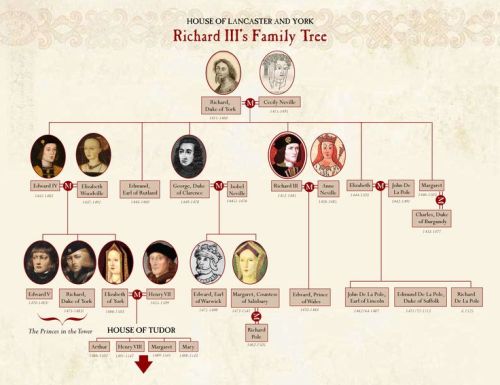I had been meaning to read Alison Weir’s The Princes in the Tower for quite some time, but being a mother slowed me down! I am usually a fan of her work but not in this case.
Full Disclosure: I am a member of the Richard III Society. I acknowledge the likelihood that Richard III murdered his nephews but since there is no “hard” evidence, we should at least examine alternative theories.
In this book, Weir did no such thing. She decided Richard III was guilty and painted him as Shakespeare’s villain.
It is undisputed that Richard usurped the throne from his nephews and placed them in the Tower of London. He did this under that claim that Edward IV’s (the princes father) marriage to Elizabeth Woodville was invalid due to a precontract. Essentially, Edward IV had committed bigamy.

The above family tree is not my work. I found it on Pinterest.
Weir presents Richard’s taking of the throne as calculated murder. If Edward IV committed bigamy, the princes would have been illegitimate and unable to inherit the throne. Back in these times, that was a very valid reason for Richard III to take the throne. Being illegitimate was a BIG DEAL.
Richard was a loyal brother to Edward IV and usually did his bidding. Edward asked Richard to be Lord Protector of the realm until Edward V reached his majority.
If Richard betrayed this, perhaps it was because he felt threatened. The princes’ mother, Elizabeth Woodville, mistrusted Richard and plotted against him. Usurping the throne and getting rid of the princes may have been a way for him to protect himself and his young son.
Of course, there is the possibility that Richard did not order the deaths of the princes and someone else did it to undermine his rule.
Another thing that bothered me in this book was the assertion that Richard hastened the death of his queen, Anne Neville through poison and malicious rumors, so he could marry his niece, Elizabeth of York. I realize there was probably a flirtation or perhaps even an affair, but I just don’t think Richard killed his wife. Most accounts show a respectful marriage, and it has been written that Richard was grief-stricken at Anne’s death.
Weir also harps on the incestuous nature of Richard III’s relationship with his niece, Elizabeth of York. First, we don’t even know for sure that they had relations. If they did, it would be incestuous by our modern definition however, back in these times, the church granted dispensations for these sort of things ALL THE TIME. It’s gross to a twenty-first century mind, but don’t over-dramatize it.
My final issue with this work is that Weir relies heavily on Thomas More as a source. More lived in the Tudor Court. History is written by the victors, and I can’t imagine Henry VII would have enjoyed a favorable account of his predecessor that he killed. And if the Tudors had something to do with the murders of the princes, even more reason to vilify the last Yorkist king.
Maybe Richard III was a child-killing asshole. I would have appreciated more evidence from all sides in a work of this magnitude. I would not fault anyone from concluding that Richard III was involved in the murders, but I think there were deeper reasons than him just being a power-hungry usurper.
I enjoyed reading your thoughts on the book. 🙂
Thank you! Her books are a usually a little better developed so I was surprised.